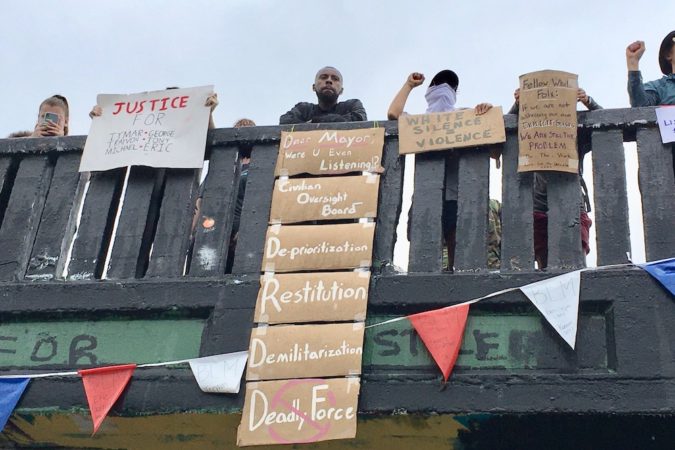
by Jeremy Morrison, Inweekly
Pensacola’s Citizen Police Advisory Committee meets for the second time Tuesday. Following the group’s initial meeting in July, Inweekly spoke with members of Pensacola Dream Defenders — the organization largely responsible for initiating the committee — about the newly formed municipal group as it begins its work.
Charles Williams, organizing lead with Dream Defenders, said that watching the committee’s first meeting made him realize the tangible results of the group’s efforts.
“It did get a little bit serious for me at one point,†Williams said, “because it was like, ‘this is real,’ but at the same time it was like I wonder what are the possibilities from here?â€
Pensacola Dream Defenders first requested that the city establish a committee to play an advisory or oversight role for the Pensacola Police Department following the July 2019 killing of Tymar Crawford, a Black man fatally shot by a former PPD detective during a traffic stop.
“This was proposed about a year ago. So, we’ve been fighting for a whole year, you know, for this committee to be in existence today,†said Aliya Eggleton, current lead of the Dream Defenders. “So, we’re really excited and proud about that.â€
Following a focus on internal operations within the police department, Mayor Grover Robinson and the Pensacola City Council selected members for the new advisory board led by retired law-enforcement officer Cedric Alexander. The committee will not be addressing specific issues or incidents related to the PPD, but rather exploring broader policies and any potential changes that might be worth considering.
Eggleton said that the Dream Defenders would have like to have seen more community input involved in the committee’s formation.
“We really would’ve liked to see the community have more power and more insight on who was to be on that board, versus just having the commissioners appointing, and the mayor appointing who was going to be on this board,†she said, “because if we’re going to have people in the community on this board, I thought the community itself should’ve had more authority.â€
One of the members on the advisory committee, Hale Morrissette, comes directly from the Dream Defenders. Mayor Robinson appointed her following an incident during which Morrissette and a group of protestors blocked traffic at the foot of the Pensacola bay bridge until he agreed to the appointment; the mayor has said since that the Dream Defenders member was always going to be on the committee.
While Williams feels the traffic-blocking tactic played into the Dream Defenders securing a seat on the committee — “I don’t think it was something that was ever concrete until we made a demand at that time†— Eggleton thinks Morrissette was always going to have a seat at the table.
“I feel like Hale’s a really good person, good standing in the community. She’s been doing this a really long time and represents the community really well,†Eggleton said. “She had such a good standing in the community anyways, that regardless of the interaction or not, she would’ve made it on that board.â€
Insofar as the committee’s mission, Pensacola Dream Defenders would like to see the group have more authority. During the advisory committee’s first meeting members were told that the group’s primary mission was to gather information useful in understanding the overall function of law enforcement and the laws governing its interaction with the community, and also to make recommendations aimed at improving the relationship between the police and the people they serve.
“I don’t think there are laws set in place that puts these people on the board empowered to subpoena or investigate,†Eggleton said, pointing to similar committee’s in other parts of the country with expanded powers. “There are other models in different cities across the nation where those committees have power to subpoena, they have power to go farther into investigations. Why not Pensacola, you know what I’m saying?â€
Alexander mentioned to committee members during their first meeting that there might be occasions to contact state legislators to discuss laws at the state level and perhaps push for them to work to change certain legislation.
Williams said he’d like to see the members push to allow such police-advisory committees additional powers in their oversight of law enforcement.
“I do believe there is a bit of a conflict there, and I hope that’s maybe something we could go to the state capital and get some changes made to allow these particular communities to have subpoena power, interview power, whatever type of power we need when it comes to making sure that our police forces are not over-policing,†Williams said, explaining that he felt the reach of such committees should be on par with any internal police investigations into specific incidents and complaints.
“A lot of times it seems like they don’t really have any other type of say-so in regards to their misconduct, it’s always taken care of internally,” he said. “So, this is just another apparatus that should be used and be at least as powerful as they are in regards to making sure they don’t cross that line.â€
Pensacola’s CPAC meets Tuesday afternoon at 5:30 p.m. at Pensacola City Hall. Due to the coronavirus the meetings are only accessible to the public via an internet stream. On today’s agenda is the selection of committee heads, as well as an overview of the city charter and the police department’s policies and procedures; members will also be discussing feedback they’ve received from people in the community and identifying their top objectives.



